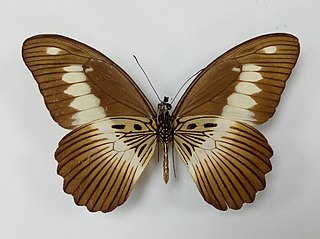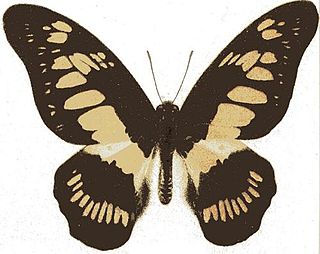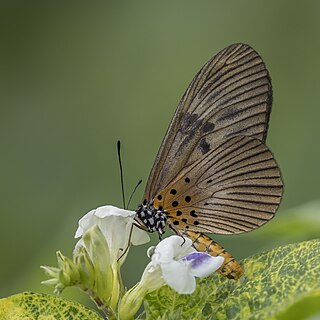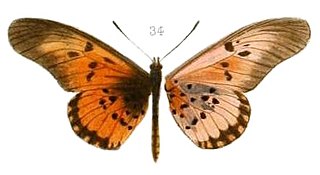
Papilio is a genus in the swallowtail butterfly family, Papilionidae, as well as the only representative of the tribe Papilionini. The word papilio is Latin for butterfly.

Papilio antimachus, the African giant swallowtail, is a butterfly in the family Papilionidae. With a wingspan between 18 and 23 centimetres, it is the largest butterfly in Africa and among the largest butterflies in the world. The wings are long and narrow and the ground colour is orange brown with black markings. P. antimachus live in the tropical rainforests of west and central Africa. The distribution area (range) stretches from Angola, Cameroon, Democratic Republic of the Congo, Republic of the Congo, Gabon, Ghana, Ivory Coast, Liberia, Nigeria, Sierra Leone, and Uganda. It is much rarer in the west of its range than in the eastern parts of its range. It probably stays in forest canopy but males come down to mud-puddle. The male is larger than the female and can be seen in groups at nectar. The females show themselves less, continually flying high above the treetops. It has been seen hill-topping in Liberia. The butterfly may have no natural enemies because it is very toxic. The larval foodplant is unknown and nothing is published on the early stages. Cardiac glycosides found in the Imago by Miriam Rothschild indicate that the so-far unidentified larva, most probably, sequesters foodplant toxins which persist through pupation into the imago as an aposematic protection against predation, and therefore that the larval foodplant is probably an asclepiad vine.

Papilio nireus, the green-banded swallowtail, narrow-banded blue swallowtail, or African blue-banded swallowtail, is a butterfly of the family Papilionidae. It is found in Sub-Saharan Africa.

Papilio cynorta, the mimetic swallowtail or common white banded papilio, is a butterfly of the family Papilionidae. It is found in Africa, including Sierra Leone, Liberia, Ivory Coast, Ghana, Togo, southern Nigeria, Cameroon, Equatorial Guinea, the Democratic Republic of the Congo, Angola, the Republic of the Congo, Uganda, Kenya and Tanzania.

Papilio mechowi is a butterfly of the family Papilionidae found in Africa.

Papilio gallienus, the narrow-banded swallowtail, is a butterfly of the family Papilionidae. It is found in Nigeria, Cameroon, the Democratic Republic of the Congo and the central part of the Republic of the Congo.

Papilio sosia, the medium green-banded swallowtail, is a butterfly of the family Papilionidae. It is found in the Afrotropical realm. The species was first described by Walter Rothschild in 1903.

Papilio chrapkowskoides, the broadly green-banded swallowtail, is a species of swallowtail butterfly from the genus Papilio that is found in the Republic of the Congo, Uganda, Rwanda, Burundi, Tanzania, Guinea, Sierra Leone, Liberia, Ivory Coast, Ghana, Togo, Benin, Nigeria, Cameroon, Gabon, the Democratic Republic of the Congo, and Angola.
Papilio fernandus is a species of swallowtail butterfly from the genus Papilio that is found in Equatorial Guinea.

Papilio filaprae is a species of swallowtail butterfly from the genus Papilio that is found in Cameroon, the Democratic Republic of the Congo, the Republic of the Congo, Angola and Equatorial Guinea. The species was first described by Ernst Suffert in 1904.

Papilio mechowianus is a species of swallowtail butterfly from the genus Papilio that is found in Angola and the Republic of the Congo.

Papilio zenobia, the Zenobia swallowtail or Volta swallowtail, is a species of swallowtail butterfly from the genus Papilio that is found in Guinea, Sierra Leone, Liberia, Ivory Coast, Ghana, Nigeria, Cameroon, Equatorial Guinea, the Republic of the Congo and Uganda. It was first described by Johan Christian Fabricius in 1775. The habitat consists of wetter forest in good to reasonable condition.

Papilio menestheus, the western emperor swallowtail, is a species of swallowtail butterfly from the genus Papilio that is found in Senegal, Guinea-Bissau, Guinea, Sierra Leone, Liberia Ivory Coast, Ghana, Togo, Nigeria, Cameroon and Equatorial Guinea.
Papilio nobicea, the Volta swallowtail, is a butterfly in the family Papilionidae. It is found in Ghana and Togo. The habitat consists of forests in mountainous terrain.

Graphium latreillianus, the coppery swordtail, is a butterfly in the family Papilionidae. It is found in Guinea, Sierra Leone, Liberia, Ivory Coast, Ghana, Nigeria, Cameroon, Sao Tome and Principe, Equatorial Guinea, Gabon, the Republic of the Congo, Angola, the Central African Republic, the Democratic Republic of the Congo, Chad, Uganda and Tanzania.

Acraea rogersi, the Rogers' large acraea, is a butterfly in the family Nymphalidae which is native to the African tropics and northern subtropics.

Bematistes vestalis, the smoky bematistes, is a butterfly in the family Nymphalidae. It is found in Senegal, Guinea, Burkina Faso, Sierra Leone, Liberia, Ivory Coast, Ghana, Togo, Nigeria, Cameroon, Gabon, the Republic of the Congo, the Democratic Republic of the Congo and Tanzania.

Acraea bonasia, the bonasia acraea, is a butterfly in the family Nymphalidae which is native to the African tropics and subtropics.

Acraea pharsalus, the east African forest acraea or Pharsalus acraea, is a butterfly in the family Nymphalidae which is native to the tropics and subtropics of Africa.

Acraea perenna, the falcate acraea, is a butterfly in the family Nymphalidae which is native to the African tropics and subtropics.



















